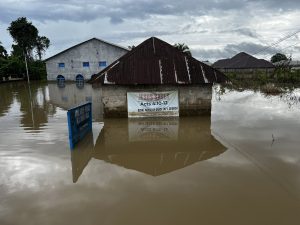With over 600 deaths and 1.3 million displaced from their homes, Nigeria is suffering from its worst flooding in a decade, according to the World Economic Forum.
The threat of Nigerian cities and villages being overrun by water is not sudden or abrupt. In 2021, the Nigeria Hydrological Services Agency (NHSA) predicted that 27 of the 36 States including the FCT, are at substantial risk of flooding. The agency had called on the government and the citizens to take appropriate cautions to mitigate the effects of the flood, but it seems the pleas fell on deaf ears.

33 states of the 36 States including the FCT, are flooded; the deluge of water in Nigerian cities has been accompanied by a series of conversations on climate change, government responsiveness, humanitarian crisis and many more. Still, less attention is being paid to indiscriminate waste disposal – an act that blocks our drainage system hence aggravating flooding.
Indiscriminate waste disposal is the unlawful disposal of waste in undesignated spaces such as open or vacant land, sources of water and other areas. As a Nigerian, you are not strangers to people dumping huge waste piles in water bodies and drainages.
The government has not been idle; they’ve made legislations and agencies to deter indiscriminate waste disposal – Kwara Environmental Protection Agency (KWEPA), Lagos Waste Management Authority (LAWMA), Ogun State Waste Management Agency (OGWAMA) and many more. Sadly, these agencies, except a handful, have done nothing but pay only lip service to the fight against indiscriminate waste disposal.
In 2021, LAWMA jailed 83 and fined 4,200 for indiscriminate waste disposal in Lagos; these statistics underscore how rampant and prevalent poor waste disposal is. Amid growing concerns about the country’s flood, governments are warning against indiscriminate waste disposal. The Special Adviser to the Governor on Environment, Mr Ola Oresanya, warned against the environmental impact of illicit refuse dumping on the well-being of the citizens.
The task of keeping the communities safe is not the government’s job only; the citizens must partake and participate heavily. Many do not know much about garbage disposal than pouring it into the waterways or an empty swath of land.
The first and most prominent one is placing the waste at designated spots for agencies to pick and dispose of them with methods that are not harmful to society.
In instances where you want to dispose of your waste; recycling is the best bet. You need to get suitable containers for every waste they will be recycling – plastic, bottles etc. It is essential to know that 75% of waste is recyclable.
Another mode of disposing of waste is composting. Composting is the natural process of recycling organic matter, such as leaves and food scraps, into a valuable fertiliser that can enrich the soil.
There are several ways to dispose of waste, and it is easier than ever before. You should endeavour to encourage other people to dispose of their trash correctly. To establish a sustainable, healthy environment, we all need to change and become more environmentally aware. One individual can make a difference.